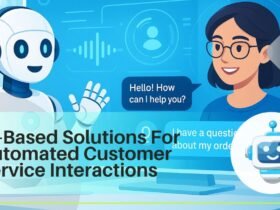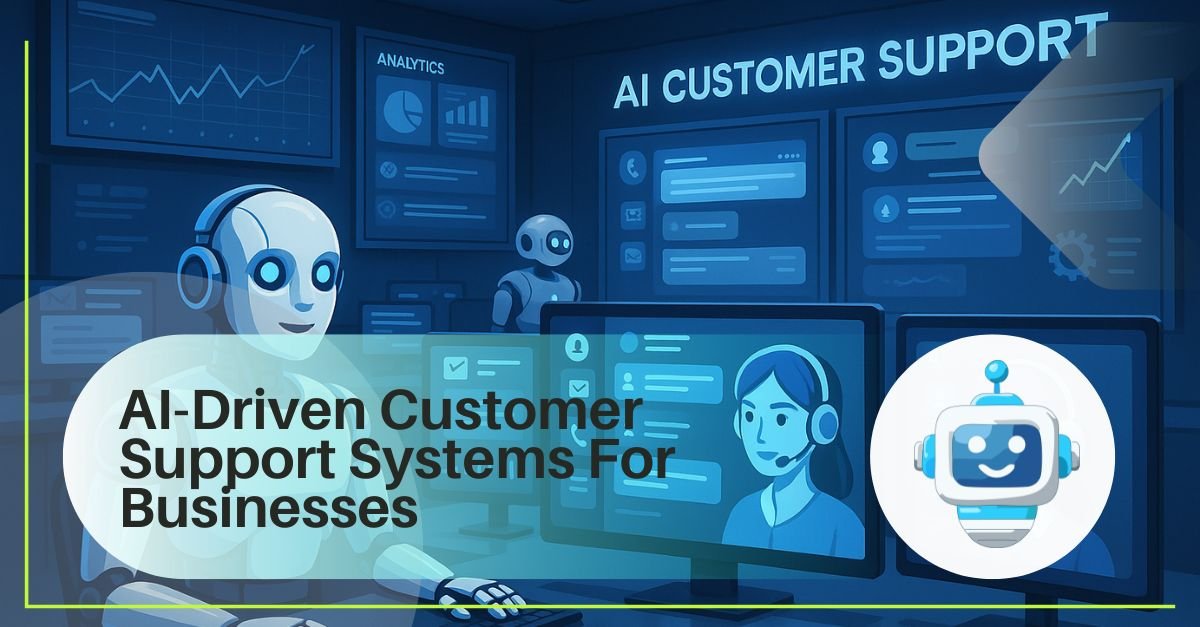Customer-support is a critical element that helps in defining customer experience, leading success of any business. Customers need their needs to be addressed quickly, in a personalized approach, and at any hour, and the traditional customer service system is failing to fit the gap. That is the scenario in which AI-based customer support systems can be used.
Artificial Intelligence (AI) has in the recent years emerged as a necessary resource in boosting customer support in various industries. AI will be able to deal with routine requests, offer individual recommendations, and make sure that the customers will be provided with answers promptly and correctly. Due to the capacity to work with huge data volumes freely and learn past interactions, one can enhance a service and guarantee customer satisfaction rather effectively than could be done by ordinary support systems.
What Are AI-Driven Customer Support Systems?
AI-powered customer support means applying the artificial intelligence technologies, which include Machine Learning (ML), Natural Language Processing (NLP), Speech Recognition, and Predictive Analytics to the processes of customer service. These systems are dynamic and efficient in terms of managing customer interactions since the businesses are able to respond quicker, more personalized, and efficiently.
AI-powered systems can engage in numerous activities that have been performed by human agents, including answering frequently ask questions, troubleshooting, and responding to customer queries. They are also able to offer proactive assistance by foreseeing the customer needs in line with the previous behavior and experiences.
Key Features of AI-Driven Customer Support:
-
Automation: Automation of repetitive jobs like responding to basic queries through AI frees human agents in dealing with more complex matters.
-
Personalization: AI can use the information about customers and customize the answers and advice to the specific users.
-
24/7 Availability: AI can also be available at any time, which means customers will never lack support at any time of the day.
-
Efficiency: An AI system is also competent to process high levels of requests at any one time and this makes the process fast and the customer is more satisfied.
-
Proactive Support: AI-enabled data analysis enables proactive support in a manner that the AI predicts what the customer would want prior to the occurrence of the problem.
How AI Improves Customer Support for Businesses
Artificial intelligence has a variety of advantages to companies interested in developing their customer care platforms. These are some of the most important ways how AI is revolutionizing customer service:
1. Faster Response Times and Improved Efficiency
Among the main benefits of AI in customer support, one can mention the capacity to offer rapid responses. With AI, in a matter of seconds, customer requests will be processed, minor problems will be solved easily, and a customer can be helped almost immediately. Such effectiveness is not only able to enhance the contentment of customers but also enables the business to handle increased inquiries without necessarily acquiring more resources.
Example: AI-driven chatbots have the capability to answer common queries at a glance like What is your return policy? or How to change the password? This will enable human agents to concentrate on more complex questions that need a personal touch.
2. 24/7 Customer Support
Conventional customer care departments usually work during working days, and hence customers are left on their own at odd hours. However, AI-based customer support systems ensure that customers receive round the clock assistance so that they can be assisted irrespective of time and location. This is especially advantageous in cases where we have a business with global customers or where customers in an enterprise might require an urgent support at any given time.
Examples: Support systems fueled by AI may help customers with some urgent questions in the middle of the night or on weekends, allowing constant availability of support without human agents having to be on call 24/7.
3. Cost Savings
The technology of AI is capable of off-loading numerous customer support processes that would have needed human attention. Businesses can save a lot of money by outsourcing the simple tasks like responding to common questions or taking direct requests as the number of human agents required would decrease due to the automation of routine activities. Moreover, AI can be scaled accordingly to demand and businesses will be able to handle larger amount of customer request without paying more.
Example: An online retailer can take the inquiry of order tracking through AI chatbot, which would otherwise need a number of agents to tackle. This alleviates the pressure to hire more staff yet give the necessary responses in good time to the customers.
4. Personalized Customer Interactions
Where customer data is concerned, AI can individualise the experience by offering customer-specific responses and suggestions, which result in a more enjoyable user experience. Based on the historical interactions, purchasing history and their tastes and preferences, AI systems can provide the right solution and suggestions that are specific to each customer.
Example: On a banking app, a virtual assistant can study the spending habits of a customer and propose how they can economise or even suggest a financial product according to their needs and objectives.
5. Proactive Support
AI can also be able to predict the needs of the customers and provide support before problems occur. Based on how users act and determine their trends, AI systems will be able to determine when a customer will encounter an issue and provide a solution beforehand.
Example: In case a customer often comes into a particular product page and does not buy it, AI will remind or even provide some discount and persuade a customer to buy it.
AI Tools for Customer Support
Businesses have many different kinds of AI tools that can be used to improve their customer support processes. These are some of the most applied AI-powered tools in customer support:
| AI Tool | Description |
|---|---|
| Chatbots | Automatic bots who offer quick answers to customer queries. Perfect in dealing with frequently asked questions and straightforward requests. |
| Virtual Assistants | Personalized help based on AI-powered helpers that advance customers through processes and help them solve problems. |
| Predictive Analytics | Artificial intelligence programs that know a customer and allow providing assistance before the latter has to request it. |
| Natural Language Processing (NLP) | Allows AI to make sense of human language and correspondingly render more and pertinent answers to customer requests. |
| Automated Ticketing Systems | Support systems using AI to sort and prioritize support tickets according to urgency to automate the process of support. |
| Voice Assistants | Voice recognition using machines with artificial intelligence that will allow a customer to interact via voice and gain hands-free assistance. |
Challenges of Implementing AI-Driven Customer Support
Though there are a lot of positive aspects to AI application, several issues might appear to businesses that implement AI-powered customer support systems:
1. Data Privacy and Security
AI systems are customer-based systems that depend on customer data to provide the customer with a personalized experience and provide them with efficient service. This brings the issue of data security and privacy. Companies need to make sure whether they satisfy data protection laws like GDPR and CCPA and protect valuable customer data.
Solution: The businesses to overcome this challenge need to ensure strong data protection standards and also they need to be open about the use of customer data. Furthermore, they ought to make sure that their AI systems do not go against privacy regulations.
2. Handling Complex Inquiries
An AI can be highly accurate when undertaking routine, mundane work and can have difficulty with responding to a complicated question that requires human emotion or subtle familiarity. To illustrate, AI might not work very well with problems involving customer sentiments or matters that are rather specific.
Solution: The best solution is a hybrid of the two: when AI tackles simple requests, and more complicated task is handed over to the human agents who might respond in a more personalized, empathetic, and complex way.
3. Integration with Existing Systems
Incorporating the existing customer service system with an AI tool may not be easy, and the situation could be complicated when existing businesses use legacy systems or multifaceted platforms. This is a tricky task that needs planning and technical skills to make AI solutions complement the other platforms and tools, such as CRMs, databases, communication platforms, etc.
Solution: Companies are advised to select AI applications that should be easy to integrate with their current systems and should work together with established developers to make the implementation process easy.
The Future of AI in Customer Support
With the further development of the AI technology, the support will increase in its capacity. The coming times hold more advanced, personal, and intelligent experiences to businesses as well as customers. Some of the key trends and innovations waiting in the future are:
1. Hyper-Personalization
AI will enhance personalization to a new level because it will have better grasped the preferences and needs of customers. In addition to basic suggestions, AI will provide hyper-personalization, as it will adjust to individual customer behavior on a per-minute basis. AI solutions will take into consideration various parameters such as the browsing history of a customer, communication with them, localization, and even emotional tenor so as to provide the experiences that would feel customized to every user.
Example: In future, visiting a particular e-commerce site, a customer can be served with a personalized home page that is dynamically changing in real time with the products that the customer is highly likely to be interested in depending on his or her latest search, past records, purchases and even based on the time of the day.
2. AI-Driven Predictive Support
Predictive analytics is one of the most promising trends in the area of AI customer support. The more a customer interacts with an AI in the past, the more it will be able to predict and foresee the problem before it occurs. The users will not even have to request assistance when AI-based technologies will already have the answer and assist the customer by suggesting the best solution before they even begin to query.
Example: When a customer is on the brink of receiving a delay in their shipping, AI can send a warning beforehand with an apology and how to solve the issue with other shipping choices such as rapid shipping. This more proactive and client orientated.
3. Seamless Omnichannel Support
With consumers connecting with brands on numerous touchpoints (websites, mobile applications, social networks, email, etc.), in the future, AI will assist companies in delivering an omnichannel support experience. AI will allow companies to monitor the correspondence on different channels and make sure that support is provided in a coherent and individual manner, regardless of how the customer contacts the company.
Example: In case a customer engages a chatbot on a website and after some time they switch to a mobile app they will see chat history and the conversation does not need to resume because the customer may explain his problem once again through AI.
4. AI-Powered Voice Support
The sphere of voice recognition is improving its qualities at a very fast pace, and voice assistants powered by AI will be even more incorporated into customer care networks. Context and knowledge of natural language will enable AI-based voice technologies to support everything, including simple user requests and complicated ones that require hands-free assistance that is convenient and efficient.
Example: The voice assistant powered by artificial intelligence, such as Alexa or Google Assistant, will allow users to solve problems, follow orders, and even receive assistance when facing technical difficulties by using voice commands. In the coming times, such voice assistants will be more precise and have a greater scope of support functions.
5. AI for Emotionally Intelligent Support
In theory, AI systems can already process customer data, but an AI-powered support system will also involve emotional intelligence. Sentiment analysis will enable the AI to identify the emotional tone of a language used by a customer and, based on it, react in a way. It will enable the AI to present more human and caring treatments, especially in cases that require sensitization on customer support.
Example: When a customer shares their frustration during a support chat, AI systems may alter their dialogues to recognize the emotion, reassure them, and connect them with a human contact when necessary.
Summary
Customer support systems which are powered by AI are changing the paradigm of how businesses handle their customers offering them more efficient, more personal and more scalable support options. The future of customer support will be successful as the current AI technology is improving further, and it will be more readily available with advanced tools that can predict customer needs, proactive support and fluid and multi-channel experiences.
As much as there are certain challenges associated with the use of AI in customer support, like data privacy issues, and difficulty in integrating processes, a company that adopts AI will enjoy a tremendous competitive edge. With AI-power systems businesses are able to improve customer satisfaction, improve efficiency of operations, and cut on costs besides offering a more responsive and personalized customer experience.





























Leave a Reply